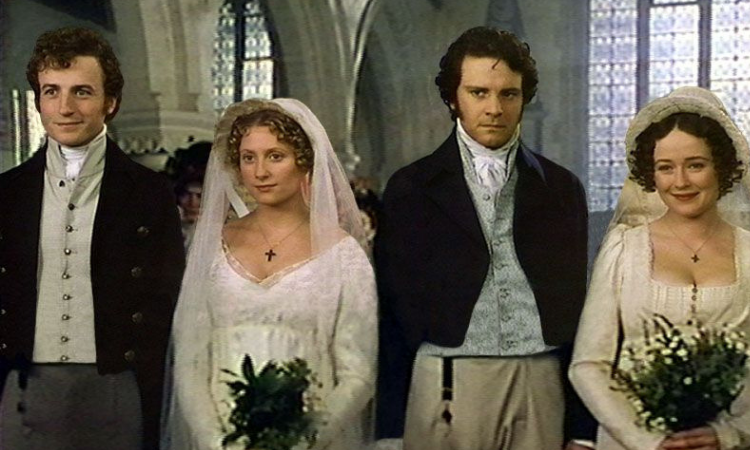
When the movie’s better than the book.
Jane Austen’s novel, Pride and Prejudice, is one of those stories I’ve never grown tired of. I’ve read it repeatedly. Listened to it in the car at least twice.
And, on more occasions than I’m willing to admit, watched the 1995 BBC TV version starring Jennifer Ehle, as the lovely, strong willed Elizabeth Bennett. And Colin Firth as the imperious Mr. Darcy. (Spoiler non-alert. If you’re not familiar with the story, this post won’t do much to change that.)
Blame my wife; she’s the one who made watching it a Christmas tradition as she wrapped presents. So, I now binge watch it around Christmas also, staying up far too late, guiltily creeping up the stairs, bleary eyed, hoping not to wake one of our out-of-town kids. Or, far worse, one of the infants that now tag along with them. Talk about living on the edge.
Perhaps I should start a support group: “Hi. My name’s Spencer. And I’m a P&Paholic.”
How can TV-of all things-improve on perfection?
Don’t get me wrong. The TV version of the story isn’t better because it deviates dramatically from the original. The novel’s sparkling repartee is faithfully recreated on the small screen. As are the novel’s twists and turns that keep readers and watchers in suspense right up to the last few pages. Or the last reel. (Unless, of course, this isn’t your first rodeo. . . but, let’s not go there.)
No, in my book, the TV version excels because it wraps with the wedding liturgy that is taken straight from the 1552, Anglican Book of Common Prayer: “Dearly beloved . . . ”
But perhaps you’re dismissive of that scene, with the four newly weds standing shoulder to shoulder, because it was just too sweet. Too “everything tied up in a pretty package with a lacy bonnet on top.”
Well, I beg to differ. And, in fact, what makes the scene a winner is its bracing astringency. A badly needed tonic in our world where marriage seems to owe more to the Mary Poppins’ variety of piecrust promises: “easily made, easily broken.” Than to the solemn vows that would be commensurate with a recognition of the central-nay, crucial- role that marriage and family play in a healthy society.
Checking the boxes
The TV version of the wedding liturgy tics all the important boxes.
“Matrimony is a holy, honorable estate, signifying the mystical union of Christ and his Church.”
Check.
“It is not to be entered into unadvisedly, lightly, or wantonly, to satisfy man’s carnal lusts and appetites, like brute beasts, but reverently, discretely, advisedly, soberly, and in the fear of God.”
Check. Again. But, how dare these religious fuddie-duddies talk about the proper role of sex right in the middle of a day that’s supposed to be about nothing but gauzy veils and getting the wedding cake frosting just so?
Well, get ready. Because there’s more. “The procreation of children.” “A remedy against sin and fornication.” “For the help and comfort of one another, in both prosperity and adversity.”
But in the end, don’t take my word for it. Watch the show. Right to the end. Give it some thought. Maybe, even, make it a Christmas tradition.
But take care. You may wind up as a member of P&Panonymous, too.




Good Roman Catholic theology about marriage. I agree. Thank you. Blessings on your family.
Mary Ellen,
Thanks so much for stopping by and your comment. Merry Christmas to you and your family!
Good job on your blogging. I’ll have to watch the movie
Ken
With limited exceptions, emails and any files transmitted with them are subject to public disclosure under the Colorado Open Records Act (CORA). To promote transparency, emails will be visible in an online archive, unless the sender puts #PRIVATE in the subject line of the email. However, the City of Fort Collins can’t guarantee that any email to or from Council will remain private under CORA.
Ken, Thanks for dropping by. Merry Christmas to you and Debbie!
>
I took a DVD of P&P up to Vail quite a few years ago. It’s not the same version as the one you write about, but also entertaining and satisfying. I’ll see about finding your version. I’m ready to wrap some presents.
Good to hear from you. Hope you’re feeling well. This version is long, but accept no substitutes!